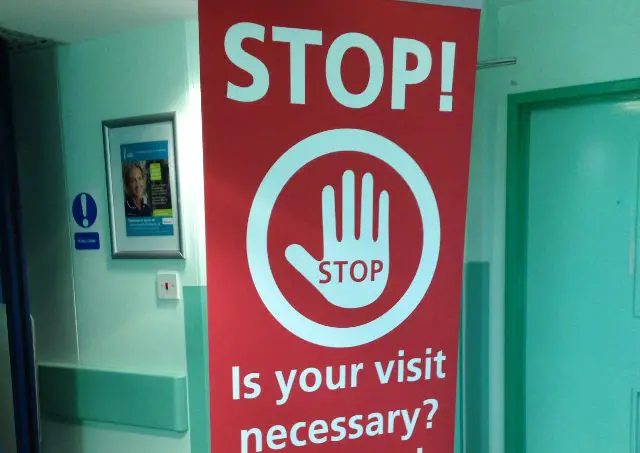The IW NHS Trust share this update on the Norovirus situation at St Mary’s Hospital in Newport, Isle of Wight. Ed
Isle of Wight NHS Trust is aware that a number of cases of diarrhoea and vomiting are circulating in the community, and Norovirus is now reported on two wards at St Mary’s Hospital.
Visits to Colwell and Whippingham wards at St Mary’s should only be made if essential, and potential visitors are encouraged to call before traveling to check the latest position. Luccombe Ward which was reported with a case last week is now clear of norovirus.
Stop visiting patients if you are sick
Visitors to the hospital, other health care facilities (GP surgeries, health clinics and nursing homes – and other places where people are vulnerable e.g. residential care homes) are advised that it is vitally important for those who have been unwell with vomiting and/or diarrhoea recently, especially if they have had these symptoms in the past 48 hours, to stop visiting patients, relative or friends.
Advice previously issued:
Dr Mark Pugh, Executive Medical Director at Isle of Wight NHS Trust said:
“We would ask members of the public who have had diarrhoea and vomiting to stop visiting unless they have been clear of the symptoms for at least 48 hours.
“Everyone visiting the hospital or other healthcare facility for any reason is encouraged to make use of the hand gel and hand washing facilities provided. This is not only to protect patients who are vulnerable, but also our staff who are needed to deliver our services.”
Stay at home for at least 48 hours
It is vital that anyone who is feeling unwell with vomiting and/or diarrhoea, planning to visit their friend or relative in hospital, nursing or a residential home, stays at home for at least 48 hours after the symptoms stop to avoid the spread of infection. Keeping hydrated and drinking plenty of fluids is very important, particularly for the elderly and the very young that are most at risk. If the symptoms persist, telephone NHS 111.
Further details of symptoms are available on the NHS Choices website.
Stay clean
Good hygiene is important during outbreaks of diarrhoea and vomiting as it is highly contagious. To prevent becoming infected it is very important to wash your hands with soap and water after you have been around someone who is ill.
Thorough cleaning of hard surfaces with a bleach solution, paying particular attention to the toilet and toilet area will help to reduce the spread of the virus.





